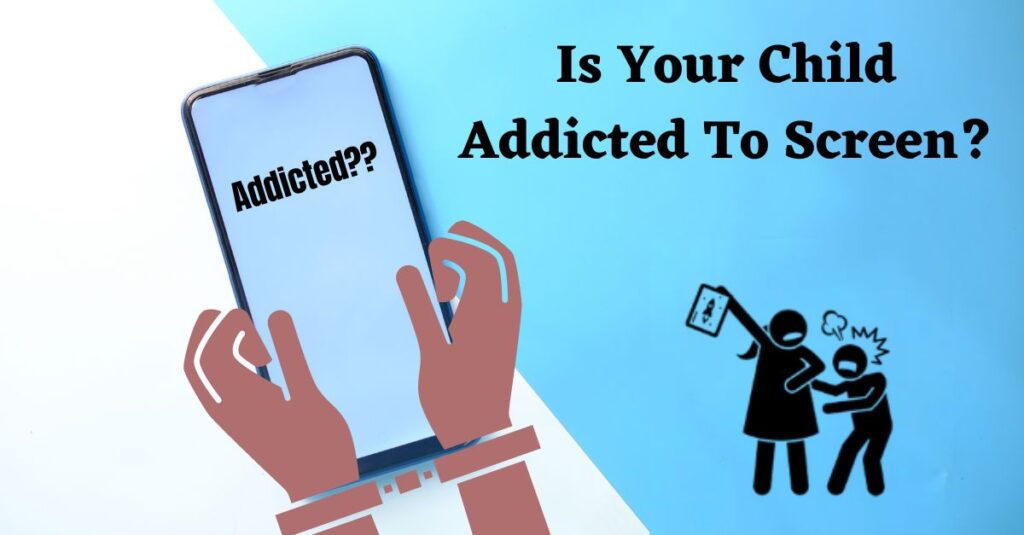Is Your Child Addicted To Screen Or Mobile? Signs You Should Consider

As devices continue to become more and more accessible to children, the time they spend on them is also becoming a growing concern for parents. Screen addiction in children is becoming a major concern for parents because it can have negative effects on their mental health. In fact, studies show that excessive use of screens can lead to an increased risk of depression and anxiety in adolescents. The problem is that many kids don’t even realize that they are addicted to screens because they don’t know what life was like without them.
We all know that tablets and smartphones can help kids develop the cognitive skills required to understand some of the most fundamental human languages, but they can also, regrettably, lead to a vortex of screen addiction. While we sleep, our children enter the rooms at night and turn on Netflix, or they rush to our phones like a gopher in search of a golden nugget. Keep your sanity as a parent with these signs and solutions for dealing with your child’s addiction to screens.
Why Screen And Mobile Addiction Happens
Your child is spending more time on their screens and mobile devices than ever before. While this can be a normal part of childhood development, it can also be a sign of screen or mobile addiction.
There are a number of reasons why screen and mobile addiction may occur in children. One reason is that these devices provide a constant source of entertainment and stimulation. This can be especially appealing to children who are bored or unhappy.
Another reason for screen or mobile addiction is that these devices can be used to escape from problems or difficult emotions. Children may turn to screens as a way to avoid facing challenging situations in their lives.
If your child is exhibiting signs of the screen or mobile addiction, it is important to seek professional help. These problems can have a negative impact on your child’s development and mental health.
How to identify the signs that your child is addicted
When it comes to addiction, there are many different ways that it can manifest itself. However, there are some common signs and symptoms that you should look out for if you suspect that your child may be addicted to screens or mobile devices.
1. Increased isolation and withdrawal from social activities.
If your child is spending more and more time alone in their room with their screens or mobile devices, this could be a sign that they are becoming addicted. They may prefer to watch TV or play video games than go out and play or participate in activities that they once enjoyed.
2. Disrupted sleep patterns.
If your child is staying up late at night to play games or chat with friends online, this can lead to sleep deprivation and can eventually impact their health. You may also notice them falling asleep in class or during other activities during the day.
3. Difficulty concentrating or focusing on tasks.
Screens and mobile devices can be extremely distracting, which can make it difficult for children to focus on schoolwork or other tasks. Your child may start to neglect his/her school work, chores, and other responsibilities because he/she prefers to spend time on a screen instead of doing something productive.
4. Irritability or mood swings: outbursts of anger over small things
Anger is a common emotion associated with addiction as addicts often feel frustrated when they cannot access the substances or behaviors they are addicted to. If your child is displaying sudden outbursts of anger for no apparent reason, this could be a sign. They may start to feel anxiety or agitation when they are away from their screens for too long.
Ways that you can help establish healthy boundaries with technology
It can be tough to establish healthy boundaries with technology, especially if your child is already addicted to screens or mobile devices. But there are ways you can help. Here are a few suggestions:
1. Sit down with your child and talk about the importance of setting limits on screen time. Explain why it’s important to have balance in their life and how too much screen time can impact their health and well-being.
2. Help them come up with a plan for limiting their screen time. This could involve setting a daily limit, only using screens during certain times of day, or taking breaks throughout the day to move around and do other activities.
3. Stick to the plan yourself! If you’re constantly on your phone or tablet in front of your child, they’re going to have a harder time following the rules you’ve set for them. Set a good example by putting away your own devices when it’s time to focus on other things.
4. Be understanding but firm when enforcing the rules you’ve set. If your child argues or tries to bargain with you, stay calm and remind them of the importance of following the plan. Once they know you’re serious about it, they’re more likely to stick to it themselves.
What You Can Do
If your child is addicted to screens or mobile devices, there are a few things you can do to help them.
Talk to your child about their screen use and why it concerns you. Set limits on screen time and be consistent with enforcement. Provide alternative activities for your child to do instead of being on their device. Seek professional help if you feel like your child is struggling to control their screen use.
Conclusion
Children, who are exposed to screens all day long, develop a dependency on them. This dependency is not just physical but also emotional and mental. The attachment to the screens is so strong that the children feel incomplete without them. If you think your child might be addicted, don’t hesitate to reach out for help from a professional. With the right treatment, your child can overcome their addiction and lead a healthy, happy life.




